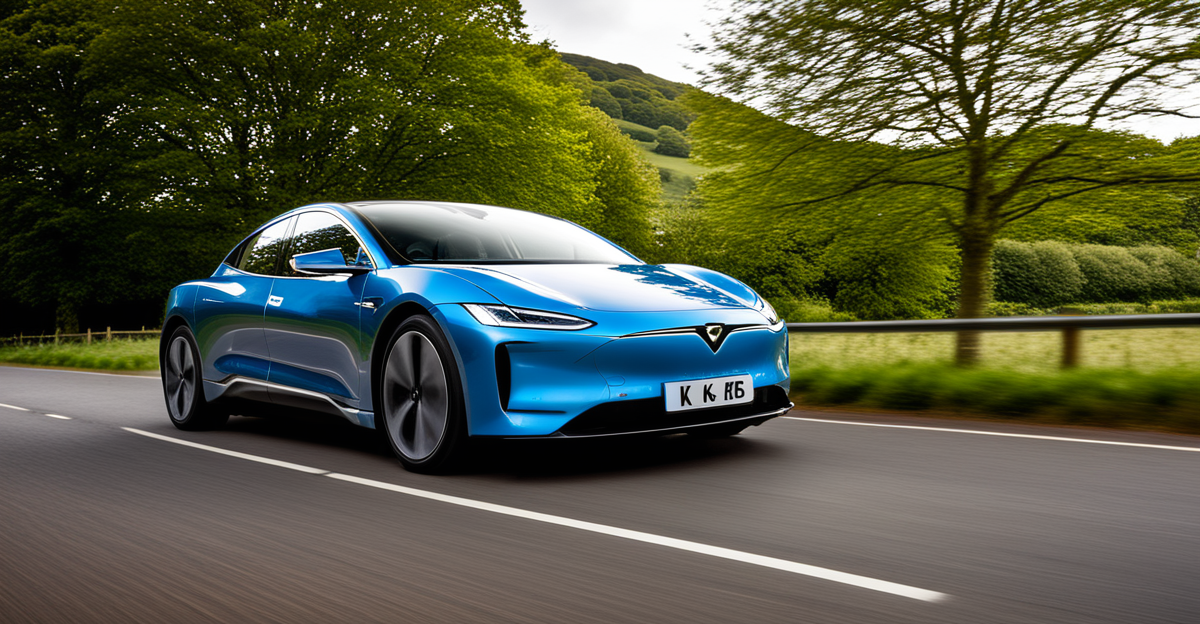Electric Cars and the Transformation of the UK Automotive Industry
Electric cars UK are driving a profound transformation in the UK automotive industry. Currently, the sector is shifting from traditional internal combustion engines to electric vehicle (EV) technologies at an accelerating pace. This change is fueled by growing consumer demand, regulatory pressures, and advances in battery efficiency.
A key trend in electric vehicle adoption involves increased infrastructure support and government incentives, making EVs more accessible and practical for everyday use. Moreover, the rise of EVs is fostering innovation in manufacturing processes, encouraging automakers to redesign production lines and embrace new technologies.
Topic to read : What are the future prospects for hydrogen cars in the UK market?
These developments are not only reshaping how vehicles are built and sold but also redefining the future of UK vehicles. Compared to conventional cars, electric vehicles offer lower operational costs and reduced emissions, aligning with the UK’s environmental goals. As a result, the automotive industry transformation extends beyond technology, influencing economic models, workforce skills, and market dynamics.
Overall, the electric cars UK movement represents a crucial turning point, positioning the UK as a competitive player in the global EV market while catalyzing broad industrial evolution.
Also to see : What are the implications of trade agreements on UK car exports?
Economic Impact of Electric Cars in the UK
The EV economic impact UK is increasingly significant as the sector reshapes employment and investment patterns. Transitioning to electric cars UK demands new workforce skills, emphasizing software development, battery technology, and electrical engineering. This shift creates opportunities for automotive jobs within manufacturing and associated supply chains, although some traditional roles tied to combustion engines are declining.
Investment in electric vehicles fuels innovation hubs and regional manufacturing facilities, stimulating local economies. For example, new gigafactories for batteries attract substantial capital and boost local employment, reinforcing the UK automotive industry transformation. Additionally, the demand for components unique to EVs supports auxiliary industries, such as electronics and power management.
Exports of electric cars UK are expected to increase, expanding the UK’s market reach globally. This economic evolution not only enhances the UK’s competitiveness but also fosters technological leadership. Understanding the EV economic impact UK helps stakeholders address workforce retraining and infrastructure development proactively, ensuring a balanced growth trajectory within the evolving automotive landscape.
Electric Cars and the Transformation of the UK Automotive Industry
Electric cars UK are central to the ongoing UK automotive industry transformation. Today, the industry is navigating a shift where electric vehicles increasingly replace traditional petrol and diesel cars. This transition is visible in changing production techniques and new business models embraced by manufacturers. Key trends in electric vehicle adoption include widespread consumer interest driven by affordability improvements and environmental awareness.
The future of UK vehicles will likely be dominated by electric models, supported by enhanced battery technologies and smarter energy management. Automakers are integrating cutting-edge innovations such as lightweight materials and advanced software platforms, reshaping vehicle design and performance standards.
Furthermore, electric cars UK encourage sustainability goals by directly reducing automotive emissions. The transformation is comprehensive, influencing supplier networks, skills development, and market demands. As a result, the UK automotive industry transformation isn’t just about swapping engines—it is about rethinking mobility. This shift promises not only a cleaner transport future but also new economic prospects tied to electric vehicle leadership and technology exports.
Electric Cars and the Transformation of the UK Automotive Industry
The UK automotive industry transformation is accelerating with the widespread adoption of electric cars UK. Presently, the industry is shifting its focus from traditional internal combustion engines to electric drivetrains, driven by evolving consumer preferences and regulatory frameworks. Central to this change is the integration of advanced battery technologies, which enhance vehicle range and efficiency, directly influencing the future of UK vehicles.
This transformation also involves significant reshaping of manufacturing processes. Automotive plants are retooling to accommodate electric motor assembly and battery pack integration. Moreover, digital connectivity and software updates embedded in electric cars are introducing new standards of vehicle performance and maintenance.
Key trends include the expansion of EV models across multiple segments, from compact cars to luxury vehicles, supported by increasing infrastructure and decreasing battery costs. The momentum behind electric cars UK signals a fundamental shift, fostering innovative approaches to design, production, and consumer engagement. As a result, the UK automotive industry transformation is redefining the nation’s car market while positioning it at the forefront of global electric mobility.
Electric Cars and the Transformation of the UK Automotive Industry
The UK automotive industry transformation is progressing rapidly, driven strongly by electric cars UK. Currently, the industry balances legacy manufacturing with expanding EV production, reflecting its transitional state. A defining trend involves mass adoption of electric vehicles amid rising consumer awareness and improvements in battery capacity, charging speeds, and affordability.
Electric cars UK not only alter vehicle manufacturing but also reshape supply chains and distribution models. Automakers integrate new materials and digital platforms, enhancing vehicle efficiency and connectivity. These changes signal that the future of UK vehicles will emphasize not just electrification but smarter, software-driven driving experiences.
Industry adaptation includes workforce retraining and infrastructure adjustments, supporting sustainable growth. Moreover, government backing and technological innovation accelerate this shift, highlighting how electric vehicles stimulate broader industrial change. By embracing this transformation, the UK positions itself to lead in global EV development, securing economic resilience and environmental benefits through comprehensive industry renewal.
Electric Cars and the Transformation of the UK Automotive Industry
The UK automotive industry transformation is deeply entwined with the rise of electric cars UK. Currently, the automotive sector is experiencing a shift from internal combustion engines toward electrification, driven by technological advances and regulatory pressures. This pivot affects not only vehicle powertrains but also manufacturing methods, supply chains, and market strategies.
Key trends in electric vehicle adoption include expanding model availability and falling battery prices, which enhance affordability and appeal. Consumers increasingly favour EVs for their reduced running costs and environmental benefits, accelerating demand growth. The future of UK vehicles is thus set on electrification, supported by innovations like solid-state batteries and improved energy management systems.
Electric cars UK also catalyse broader industry changes, from retraining workforces in electrical and software skills to reshaping supplier networks focused on EV components. This transformation aligns the UK with global shifts towards sustainable mobility. In summary, electric cars are not just new products but levers driving the comprehensive UK automotive industry transformation.
Electric Cars and the Transformation of the UK Automotive Industry
The UK automotive industry transformation hinges on the rapid integration of electric cars UK, profoundly altering the sector’s landscape. The current state reflects a dual focus: maintaining legacy production while scaling electric vehicle outputs. Key trends in EV adoption include expanding model ranges and falling battery prices, making electric cars UK increasingly accessible and appealing to consumers.
This transformation initiates a shift beyond vehicle design toward entire system reconfiguration. Manufacturing processes now prioritize electric drivetrains and battery assembly, reflecting the changing technical requirements. Additionally, the future of UK vehicles incorporates enhanced connectivity and digital software, embedding smarter functionalities.
These industry changes promote sustainability and efficiency, aligning with environmental policies and market demands. Consequently, the UK automotive industry transformation exemplifies a comprehensive renewal, combining technology advancement with evolving consumer preferences. This evolving dynamic is setting the stage for the future of UK vehicles to be dominated by innovative, low-emission electric models, which will redefine driving experiences and the automotive market in the years to come.
Electric Cars and the Transformation of the UK Automotive Industry
The current state of the UK automotive industry reflects a decisive move toward electrification, with electric cars UK becoming central to production and market strategies. This shift is driven by consumer preference changes, tighter emissions standards, and technological breakthroughs. Key trends include significant growth in EV model offerings across vehicle segments and increasing affordability linked to declining battery costs.
Electric cars UK are initiating profound industry changes beyond just vehicle design. Manufacturing processes are evolving to integrate electric drivetrains and battery assembly, requiring new skills and automated production lines. Moreover, the reliance on software and connectivity in EVs introduces a digital dimension, transforming vehicle maintenance and customer interaction.
This evolution also impacts supply chains, prompting a focus on materials like lithium and cobalt for batteries, and reshaping partnerships between traditional automakers and tech firms. The UK automotive industry transformation is thus holistic, merging mechanical engineering with software innovation to steer the future of UK vehicles toward sustainability, efficiency, and competitive global positioning.
Electric Cars and the Transformation of the UK Automotive Industry
The current state of the UK automotive industry is characterized by a significant shift from internal combustion engines to electric cars UK. This transition is fueled by growing consumer demand and government policies that encourage cleaner transport. Key trends in electric vehicle adoption include expanding model options across various segments and decreasing battery costs, making electric cars UK more accessible to a broader market.
The UK automotive industry transformation also involves retooling manufacturing processes to focus on electric drivetrains and battery assembly. This shift affects supply chains and demands new skill sets, particularly in software and electrical engineering. As a result, automakers are adapting by incorporating advanced technologies and enhancing vehicle connectivity.
Electric cars UK are initiating broader industry changes beyond vehicle design. They drive innovation in production, promote sustainability through reduced emissions, and influence market strategies. The future of UK vehicles will be dominated by these electric models, combining efficiency, digital technology, and environmental benefits. This transformation positions the UK to lead globally in the emerging electric vehicle sector.
Electric Cars and the Transformation of the UK Automotive Industry
The current state of the UK automotive industry reveals a clear pivot towards electric cars UK as the driving force behind transformation. This shift is characterised by a notable increase in EV adoption, with manufacturers expanding electric model portfolios and enhancing battery performance. Key trends include improved driving range, reduced charging times, and greater affordability, all propelling consumer interest.
Electric cars UK are not just altering vehicle designs but also initiating a fundamental UK automotive industry transformation. This involves reconfiguring manufacturing lines to specialise in electric drivetrains and battery assembly, while incorporating digital technologies for enhanced connectivity and maintenance. The future of UK vehicles will be defined by these technological integrations, signalling smarter, cleaner, and more efficient transport options.
Moreover, this transformation reshapes supply chains, emphasizing critical materials like lithium and cobalt and fostering closer collaboration between traditional automakers and tech innovators. These shifts collectively position the UK to lead in the evolving global market for electric vehicles, underscoring the strategic importance of embracing electrification for sustainable industry growth.
Electric Cars and the Transformation of the UK Automotive Industry
The current state of the UK automotive industry is defined by a decisive shift toward electric cars UK, which spearhead the ongoing UK automotive industry transformation. This evolution is propelled by key trends such as increased consumer adoption, driven by improvements in battery range, charging speed, and affordability. The expanding availability of EV models spans diverse segments, from compact vehicles to premium offerings, further accelerating market penetration.
Electric cars UK are initiating widespread structural changes within the industry. Manufacturers are reconfiguring production facilities to prioritise electric drivetrains and battery assembly lines, necessitating new technical skills focused on software and electrical engineering. These shifts are also transforming supply chains by emphasizing critical materials and fostering partnerships between traditional carmakers and tech innovators.
The future of UK vehicles is increasingly shaped by these technological and production adaptations, embracing digital connectivity, smarter energy management, and sustainable design. This comprehensive transformation reflects a convergence of mechanical and software innovation, positioning the UK automotive sector to lead in global electric mobility and support environmental commitments.
Electric Cars and the Transformation of the UK Automotive Industry
The current state of the UK automotive industry is marked by rapid electrification. Electric cars UK are increasingly prominent, reflecting growing consumer demand and government-driven incentives. This trend is evident in the expanding diversity of EV models available, catering to different market segments—from affordable city cars to premium electric vehicles. Falling battery costs and technological improvements in energy density contribute significantly to enhanced vehicle range and affordability.
Key trends include a shift in manufacturing, where facilities retool to focus primarily on electric drivetrains and battery assembly. This shift demands new technical expertise, especially in software integration, as the future of UK vehicles will blend electrification with advanced connectivity and digital features. The industry transformation also affects supply chains, emphasizing secure sourcing of critical battery materials like lithium.
Electric cars UK are not just replacing traditional vehicles; they are driving holistic changes. These span from production methods and vehicle design to after-sales services and consumer experiences. Thus, the UK automotive industry transformation represents a fundamental realignment toward sustainable, tech-driven mobility that defines the next era of transport in the UK.











